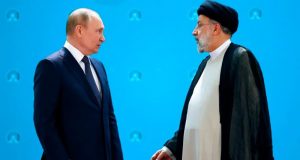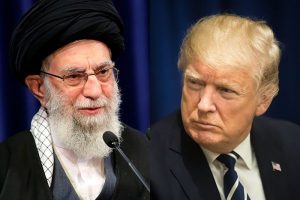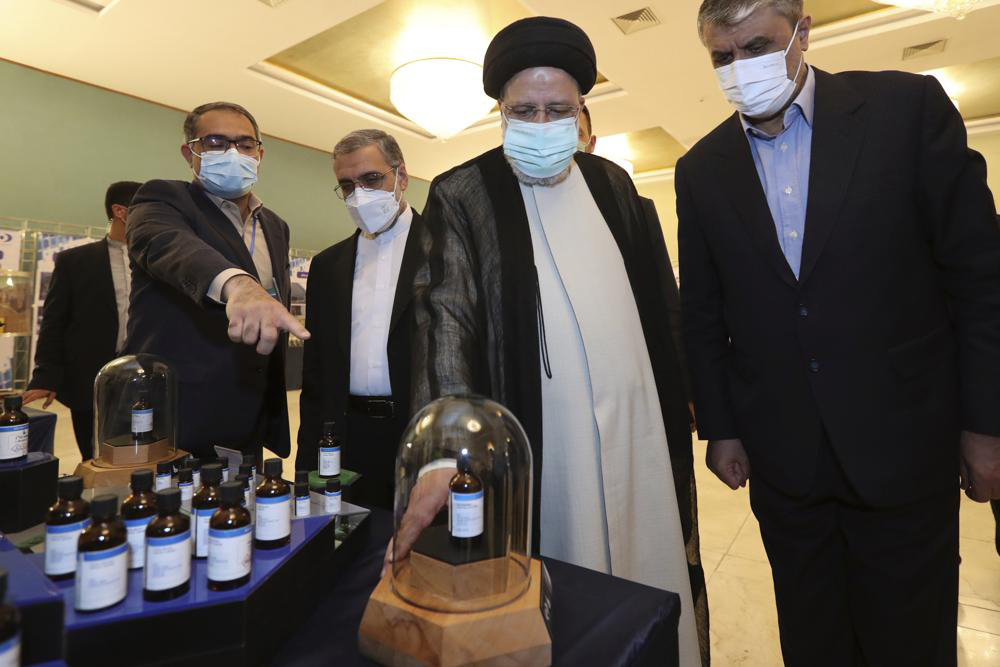Edited by: TJVNews.com
Iranian leaders feared former President Donald Trump, and after the killing of a top Iranian general, Tehran adhered to the terms of the nuclear deal, a former top Israeli national security official said Tuesday, according to a report on the World Israel News web site.
Speaking with Channel 14, Jacob Nagel, former chief of Israel’s National Security Council and former acting National Security Advisor to then-Prime Minister Benjamin Netanyahu, said that President Trump’s dramatic steps vis-à-vis Iran kept the Islamic regime in compliance with the nuclear deal – even after the U.S. withdrew from the agreement.

WIN reported that Nagel argued that while Iran has frequently violated its commitments in the past, when faced with a significant military threat, Tehran looks to avoid direct confrontation with the West – even if that means concessions in talks or compliance with restrictive agreements.
“Everybody forgets the strongest, most credible military threat on the table that there ever was,” Nagel said, as was reported by WIN.
“When Trump pulled out of the deal, [Iran] began to violate it, but in January 2020, [General Qassem] Soleimani was eliminated, and from then until Biden’s election as president, the Iranians did not violate the agreement. Why? Because there was a military threat and they were afraid.”
Initially following the U.S. withdrawal from the Iran deal in 2018, Nagel concedes, there were some Iranian violations of the agreement. WIN reported that he emphasized that in the aftermath of the Soleimani assassination, Iran remained in compliance with the deal’s provisions.
When Iran again abrogated the deal after the election of Joe Biden to the nation’s highest office, it did so far more egregiously than it had immediately after the U.S. withdrawal from the deal, Nagel claimed, as was reported by WIN.
“Pay close attention to what happened. While there were a bit of violations, the real violations started after Biden came to power. Why? Because the Iranian doctrine rests on four legs. One, the Biden administration is weak; two, and incorrectly, [Iran believes] Israel sees the U.S. as weak and therefore Israel will not attack. Third, there is no credible military threat [against Iran], and fourth, [the Iranian] economy will survive,” Nagel said.

He added that while military threats can help keep Iran from abrogating existing agreements, the West must also work towards a long-term solution, such as toppling the regime, the WIN report indicated.
To this end, Nagel drew from Ronald Reagan’s anti-Communist strategy aimed at ending the Cold War.
“Aside from the military threat, we need to do what was called the ‘Reagan Doctrine’ of 1976 on how to topple the Soviet Union. We need a doctrine for how to topple Iran economically and psychologically,” he said, according to the report.
WIN also reported that Iran has significantly ramped up its advanced uranium enrichment processes, as the signing of a nuclear deal, which would see the end of crippling sanctions levied against the Islamic Republic in exchange for a pledge to curb its nuclear program, seems closer than ever.
According to a classified report by International Atomic Energy Agency (IAEA) watchdog group, which was obtained by Reuters, Tehran is moving full speed ahead with uranium enrichment, a move that comes after Iran repeatedly violated international agreements about the process, WIN reported.
Reuters reported that for more than a year, Iran has been enriching uranium at up to 60 percent purity, the amount which is necessary in order to create a nuclear weapon, at one of its nuclear sites.

Now, the country has installed additional advanced centrifuges to speed up enrichment at the underground Fuel Enrichment Plant (FEP) located within the Natanz nuclear development site and Fordow nuclear site, which is inside of a mountain, as was reported by WIN. The new centrifuges are enriching uranium faster, but at a lower purity rate.
The nuclear deal that Tehran and Western powers appear to be close to signing would see Iran agree to using only first-generation IR-1 centrifuges, which would significantly slow down the uranium enrichment process.
“On 28 August 2022, the Agency verified at FEP that Iran was feeding UF6 enriched up to 2% U-235 into the IR-6 cascade … for the production of UF6 enriched up to 5% U-235,” the IAEA wrote in a confidential missive to UN member states and was reported by WIN.
The fact that Iran is continuing to move ahead with its uranium enrichment program and appears to be taking steps to speed up the process has sparked concerns among Western diplomats about Iran’s intentions in signing the agreement.
The Reuters report noted that because the advanced centrifuges are installed in sites deep underground, Western airstrikes aimed at stopping the enrichment could prove ineffective, according to the WIN report.
Israel and the U.S. have repeatedly signaled in recent weeks that they are prepared to take military action against Iran in order to prevent the country from obtaining a nuclear weapon.
On Monday, WIN reported that former Mossad chief Yossi Cohen said that under his tenure Israel had carried out “countless operations” in the heart of Iran against its nuclear program, adding that the Islamic Republic was “lying to the whole world” when it said its program was for peaceful purposes.
“During my term as Mossad director, countless operations were conducted against Iran’s nuclear program,” he said to an audience of 1,500 Jewish leaders at the 125th anniversary commemoration of the First World Zionist Congress in Basel, Switzerland..
“Without going into too many details, I can tell you the Mossad had many successes in the fight against Iran’s nuclear program,” Cohen said. “We operated around the world and on Iranian soil itself, in the very heartland of the ayatollahs,” he said, according to the WIN report.
“The Iranian regime is lying to the whole world and we proved it when we brought thousands of documents from the Iranian archives, documents that proved that the Iranians lied to the IAEA,” he said, referring to the U.N. nuclear watchdog.
“This regime calls for the destruction of the State of Israel and wiping it off of the map. We can never allow a regime that calls for our destruction to get its finger on the nuclear trigger,” he said, as was reported by WIN.
“Iran seeks to encircle Israel, from Gaza in the south to Lebanon and Syria in the north. It funds, trains and arms terrorist groups like Hezbollah, Hamas, and Islamic Jihad, enabling them to shoot thousands of rockets at Israel’s civilian population,” Cohen said.
“This fanatical regime must never obtain the ability to accelerate its weapon of mass destruction that would be used against the Jewish state,” he added.
Cohen’s successor, Mossad director David Barnea, was last week quoted in Hebrew media outlets as saying the emerging nuclear deal is a “strategic disaster,” according to the WIN report.

“The agreement is a bad deal that gives Iran a license to manufacture a bomb,” Barnea reportedly said.
“The Mossad is committed to preventing Iran from acquiring nuclear weapons. The agreement does not apply to Israel, nor does the freedom of action to continue operating.”
In related news, the AP reported that Iran’s president warned Monday that any roadmap to restore Tehran’s tattered nuclear deal with world powers must see international inspectors end their probe on man-made uranium particles found at undeclared sites in the country.
In a rare news conference marking his first year in office, President Ebrahim Raisi also issued threats against Israel and tried to sound upbeat as Iran’s economy and rial currency has cratered under the weight of international sanctions, according to the AP report.
Despite the international attention on the deal as talks in Vienna hang in the balance, it took Raisi well over an hour before fully acknowledging the ongoing negotiations, as was reported by the AP. Tehran and Washington have traded written responses in recent weeks on the finer points of the roadmap, which would see sanctions lifted against Iran in exchange for it restricting its rapidly advancing nuclear program.
The International Atomic Energy Agency for years has sought for Iran to answer questions about man-made uranium particles found at undeclared sites, the AP reported. U.S. intelligence agencies, Western nations and the IAEA have said Iran ran an organized nuclear weapons program until 2003. Iran long has denied ever seeking nuclear weapons.
As a member of the Nuclear Nonproliferation Treaty, Iran is obligated to explain the radioactive traces and to provide assurances that they are not being used as part of a nuclear weapons program, as was reported by the AP. Iran found itself criticized by the IAEA’s Board of Governors in June over its failure to answer questions about the sites to the inspectors’ satisfaction.
Raisi mentioned the traces — referring to its as a “safeguards” issue using the IAEA’s language.
“Without settlement of safeguard issues, speaking about an agreement has no meaning,” Raisi said, the report indicated.
Under the 2015 nuclear deal, Tehran could enrich uranium to 3.67%, while maintaining a stockpile of uranium of 300 kilograms (660 pounds) under constant scrutiny of IAEA surveillance cameras and inspectors, as was reported by the AP. Then-President Donald Trump unilaterally withdrew America from the accord in 2018.
As of the last public IAEA count, Iran has a stockpile of some 3,800 kilograms (8,370 pounds) of enriched uranium. More worrying for nonprofileration experts, Iran now enriches uranium up to 60% purity — a level it never reached before that is a short, technical step away from 90%. The AP also reported that those experts warn Iran has enough 60%-enriched uranium to reprocess into fuel for at least one nuclear bomb.
Amid the tensions, Israel is suspected in carrying out a series of attacks targeting Iranian nuclear sites, as well as on a prominent scientist, according to the AP report. On Monday, Raisi directly threatened Israel.

Raisi said if Israel decides to carry out its threats to destroy Iran’s nuclear program, “they will see if anything from the Zionist regime will remain or not.”
At his first news conference, Raisi famously simply said “no” when asked if he would meet with President Joe Biden, the AP reported. Asked again Monday as the U.N. General Assembly looms next month, Raisi stuck to his earlier answer.
“There is no benefit for a meeting between us and him,” the president said, according to the AP report. “Neither for the Iranian nation nor for the interests of our great nation.”
In yet another development pertaining to Iran, Biden administration officials have said that Russia has faced technical problems with Iranian-made drones acquired from Tehran this month for use in its war with Ukraine, according to an AP report.
The officials, who spoke to the AP on the condition of anonymity to discuss the U.S. intelligence assessment, did not detail the “numerous failures.” The AP reported that they added that the U.S. assesses that the delivery of Mohajer-6 and Shahed-series unmanned aerial vehicles over several days this month is likely part of a Russian plan to acquire hundreds of Iranian UAVs.
The Associated Press reported last week that Russia had recently obtained hundreds of Iranian drones capable of being used in its war against Ukraine despite U.S. warnings to Tehran not to ship them. The Washington Post first reported that Russia has faced technical problems with the Iranian drones.
Russian operators continue to receive training in Iran on how to use these systems, which can conduct air-to-surface attacks, electronic warfare and targeting, on the battlefield in Ukraine, the officials said, as was reported by the AP.
The Biden administration last month released satellite imagery indicating that Russian officials visited Kashan Airfield on June 8 and July 5 to view the Iranian drones. The AP reported that at the time, White House national security adviser Jake Sullivan asserted that the administration has “information that the Iranian government is preparing to provide Russia with several hundred UAVs.”
Facing economic sanctions and limits on its supply chains due to its invasion of Ukraine, Russia is turning to Iran as a key partner and supplier of weapons, according to the AP report. Russian aircraft was loaded with the UAV equipment at an airfield in Iran over several days this month before the weaponry was flown to Russia, the officials said.
White House national security council spokesman John Kirby told reporters earlier Monday that the administration had “no update” on whether the drones had been delivered, the AP reported. He added that the U.S. has has “seen nothing that that gives us a sense of comfort” and that “the procurement, and delivery is still looming, is still in the offing.”
The AP also reported that Iran’s foreign minister, Hossein-Amir Abdollahian, said last month that Tehran had “various types of collaboration with Russia, including in the defense sector.”
“But we won’t help either of the sides involved in this war because we believe that it (the war) needs to be stopped,” he said.
The administration officials confirmed details of Iran supplying Russia with drones at a moment when the White House is also trying to prod Tehran to resume its compliance with the 2015 nuclear deal, the report indicated.
In an article that appeared on the Jewish News Syndicate web site and authored by illustrious writer and columnist Caroline Glick, she said that, “it now seems all but certain that President Joe Biden will conclude his deal with Iran. In this scenario, Israel cannot expect any significant assistance from the United States in diminishing its dangers. Israel also cannot expect to change American policy in any substantive way until after a different president is elected. This is regardless of the results of the midterm elections.”
She added that “if concrete measures aren’t taken during this interim period, Iran will enter the so-called “zone of immunity.” It will have enough military nuclear capability to operate both directly and through its proxies under a nuclear umbrella. And Israel will face a threat environment it will be hard-pressed to handle.”
(Sources: WorldIsraelNews.com, Associated Press (AP.com) and Jewish News Syndicate
(JNS.org)




